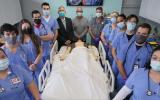Innovations

Calhoun Community College and Drake State Community & Technical College officials have developed a partnership that will not only address learning obstacles for adult learners, but job training needs as well. Greater Opportunities for Adult Learners (GOAL) is a free program designed specifically for individuals who do not have a high school diploma and want to become more employable. Individuals who enroll in the program have access to educational resources focused on improving their reading, math, and language skills to obtain a GED, learn English as a second language, and/or earn a...
Tags:

The interruption of high school students’ postsecondary education plans due to the COVID-19 pandemic is a troubling trend with long-term negative ramifications for students as well as for the nation’s economy. The trend has been particularly severe among low-income, African American, and Hispanic students (Belfield & Brock, 2020; Causey et al., 2021; National Student Clearinghouse Research Center, 2021; St. Amour, 2020). To counteract this disturbing course of events, Cuyahoga Community College (Tri-C®) and Cleveland State University (CSU) joined forces in early 2020 to recruit or...
Tags:
January
2022
Students are drawn to the arts through their desire to create, perform, express, and interact with other people. In March 2020, the give and take, central to creating art, was gone. The COVID-19 pandemic forced many students in the visual and performing arts to create in boxes on computer screens with spotty picture resolutions and sound distortions, depending on Internet speed, the weather, devices, and countless other factors.
Kirkwood Community College, like numerous other institutions, scrambled to figure out how to get art materials, microphones, speakers, and Internet access to students...

The Community College of Allegheny County’s Respiratory Therapy Associate of Science Degree program continues to help meet the growing need for skilled therapists in the Pittsburgh, Pennsylvania, region and beyond. The demand for therapists is at an “all-time high” and the program is ideal for individuals who are seeking a rewarding career that offers 100 percent job placement, according to CCAC Professor and Program Director Richard Laurent. Local hospitals are expanding respiratory therapy services, and the first group of therapists in the relatively young field is nearing retirement age....
Tags:

Humanity has had a long relationship with cannabis, with evidence dating back 12,000 years suggesting that it may be one of the oldest plants cultivated by humans (Russo, 2007; Warf, 2014). There is also a 5,000-year history of cannabis being used as a therapeutic agent (Burnett & Reiman, 2014). Siberian burial mounds contained cannabis seeds as far back as 3,000 BCE, while cannabis pollen and cannabinoids were entombed with Ramses II and cannabis seeds in Viking ships date back to the mid-9th century (Warf, 2014). The first clinical cannabis conference in the United States, in 1860, was...
Tags:

Rio Salado College (RSC) and InScribe have partnered to launch a pilot series of innovative digital communities that will allow RSC’s students to easily connect with their peers, advisors, and faculty to promote engagement and improve outcomes. These interactive spaces were designed in partnership with the college’s student leaders, incorporating their experience and feedback to ensure that each community is engaging, impactful, and relevant.
The decision to adopt a digital community strategy aligns with RSC's commitment to flexible, on-demand student support and creating an inclusive culture...
Tags:
December
2021
December 14, 2021
For more than a century, community colleges have been opening doors and creating opportunities in communities across the U.S. In the last couple of years, they’ve continued delivering on their mission in a rapidly shifting environment, pivoting and acting nimbly to meet the needs of students, faculty, and employers. While accessibility remains an issue at the forefront, it’s one of many areas where community colleges are evolving. They continue to find innovative solutions that drive value, including factors outlined in Barnes & Noble College's College 2030 report...
Tags:

This summer, dozens of middle school students in Pittsburgh, including those from underserved communities, discovered that science, technology, engineering, and math (STEM) is fun, that it’s ok to be smart, and that education can offer a path to a brighter future. Through a partnership with Verizon and the National Association for Community College Entrepreneurship, the Community College of Allegheny County (CCAC) hosted the Verizon Innovation Learning STEM enrichment program. The initiative is part of Citizen Verizon, the company’s responsible business plan for economic, environmental, and...

In the December 2020 issue of Innovation Showcase, Diane Janes and Lorraine Carter (2020a) described educational institutions’ pivot to “remote operations, quarantine, and technology-enabled strategies for working and learning” in the midst of the COVID-19 pandemic (para. 1). In particular, the article described how Southern Alberta Institute of Technology (SAIT) ensured the techno-resiliency of instructors. In response to the shift to fully online teaching and learning, the Centre for Academic Development and Innovation (CADI) created several initiatives, including the Teaching Online at...
October
2021
College students who are parents, a.k.a., student-parents, have always been enrolled in community colleges, but only within the past few years have they been explicitly recognized as a distinct student group with a unique set of support needs. According to the Institute for Women’s Policy Research (2018), more than one in five postsecondary students in the U.S. is a student-parent. This holds true at Monroe Community College (MCC), where 21.4 percent of students enrolled in 2019-2020 had children under age 18 (DeMario, 2021).
Student-Parent Risk Factors
Figure 1 shows that MCC’s student-...
Tags:

Johnson County Community College (JCCC) has partnered with Butler Community College (BCC) to offer expanded training in culinary arts. This opportunity allows JCCC to extend the benefits of its Chef Apprenticeship program to more Kansas students. In turn, the collaboration strengthens state and local workforce opportunities.
Through this agreement, BCC is offering two additional certificates to students in South Central Kansas. The new certificate options use existing BCC culinary courses with the addition of practicum courses from JCCC. Along with invaluable industry training, students in...
Tags:

At Mesa Community College’s Thunderbird Tech Studio, students can receive one-on-one guidance and tutoring for using and mastering technology that supports their academic learning. The Tech Studio team provides support for common college-supported technology tools such as Windows and Mac operating systems, Microsoft Office, Google Drive Suite, Canvas, and other systems. The beauty of the Thunderbird Tech Studio design is that it will morph into an in-person service once the pandemic subsides, thus allowing students to choose when, where, and how they receive technology tutoring and assistance...

Moraine Valley Community College introduced its new Cannabis Retail Specialist Certificate program in fall 2020 to attract students to the cannabis industry during its infancy in Illinois. In spring 2019, a retired Moraine Valley professor and department chair approached his former colleague, Dr. Margaret Lehner, Vice President for Institutional Advancement and Executive Assistant to the President, to gauge the college’s interest in developing a program in this emerging field on behalf of a vice president at Cresco Labs. Lehner discussed the issue with President Dr. Sylvia M. Jenkins and the...

The Hispanic Association of Colleges & Universities (HACU) recently designated Polk State College as a Hispanic-Serving Institution (HSI), as the college’s Hispanic student population has reached 26 percent and continues to grow. Additionally, Polk State is now eligible for Title V and HSI STEM federal grant funds that support institutions that enroll large proportions of minority and financially disadvantaged students. The college will apply for these funds through the U.S Department of Education to further support students.
Equity and a presence in underserved communities with targeted...
Tags:

Ground broke on Dallas College’s state-of-the-art Construction Sciences Building in 2019, and the need for the new training facility could not be more urgent. Before the design for the new building began, the National Center for Construction Education and Research (2019) had already predicted a shortage of one million craft professionals in the construction industry by 2023. In Dallas, the shortage is critical. From August 2018 to August 2019 alone, the Dallas-Plano-Irving area added 12,400 construction jobs and labor shortages have become a major contributor to rapidly rising new home costs...

For decades, Jackson College (JC) has been a U.S. leader in providing higher education access and opportunity to incarcerated students. The town of Jackson, Michigan, has long been known as a “prison city,” and three large correctional facilities are located less than 15 miles from JC’s Central Campus. In 1967, the college offered its first class “inside the walls.” In 1969-1970, a pilot prison education program for the Southern Michigan Prison was launched to provide qualifying inmates an opportunity to further their education.
Jackson Community College (as it was then called) was one of 26...
Tags:

To help higher education meet the demands of a diverse generation of students, an ever-changing workforce, and multiple crises affecting the U.S., Rio Salado College is partnering with the Presidents Forum on a new call to action—the Learners First Framework. The framework names ten guiding principles for reform focusing on equity, access, and workforce alignment strategies to help the country as it grapples with equitable access and outcomes, COVID-19, and related economic hardships.
“The events of this past year have brought a heightened sense of urgency to our mission to serve...
Tags:
June
2021
Congratulations to the 2020-2021 Innovation of the Year Award recipients from 32 participating League Board and Alliance member colleges. The League initiated the Innovation of the Year award over thirty-five years ago to recognize local community college projects and initiatives that reflect the spirit of innovation and experimentation on which our organization was founded. The competition provides an opportunity for colleges to showcase their innovative programs, practices, policies, partnerships, and resources; to celebrate the dedicated educators who are responsible for such exceptional...
Tags:

The Kentucky Community and Technical College System (KCTCS) Office of Online Learning developed a Boot Camp for hybrid course design meant to help faculty with little to no experience in an online setting to rapidly design hybrid courses. KCTCS Online shared an open access version of this training for use at other institutions for the first time at the department’s “Free PD: Come for the Free, Stay for the Why” session at the 2021 Innovations Conference.
The COVID-19 pandemic pushed many faculty members into a new teaching reality. Designed to help faculty quickly acclimate to online and...










